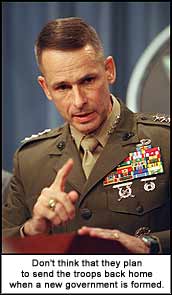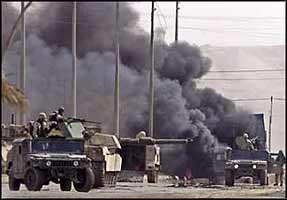Geoffrey Aronson
As the date for the formal transfer of sovereignty approaches in Iraq, attention is focused upon crafting a political process that will advance this objective. Yet if returning Iraq to the Iraqis is so important, it would be better to determine how to withdraw the well over 100,000 American soldiers who are settling in for an extended military occupation.

USA officials, particularly those in the Department of Defense, have always insisted that the political and security tracks in Iraq proceed independently of one another. As the vice-chairman of the Joint Chiefs of Staff, General Peter Pace, explained two weeks ago, USA military operations in Iraq are “independent of the process that?s ongoing now for elections, nonelections, constitutional (sic) writing, nonconstitutional (sic) writing.” In other words, the Pentagon is prepared to let the politicians chatter as long as they don?t interfere with USA military forces that are to retain the only truly sovereign power in the country.
The Bush administration may be prepared to recall American administrators from their desks in Baghdad, but the three- and four-star generals and forces under their command will remain for an indeterminate period. The reduction in USA military personnel over the next year to around 120,000 troops (from the current 150,000) is only being achieved by recruiting civilian contractors to do some jobs. In short, the administration envisages no reduction in the ability of USA forces to project their power throughout Iraq.
The closest USA officials dare to come to estimating a time frame for “staying the course” is Secretary of Defense Donald Rumsfeld?s hardly reassuring view that “our hope and expectation is that we?ll be able to draw down our forces over some reasonable period of time.”
USA policymakers appear to be under the illusion that the creation of an Iraqi government that draws its legitimacy from the Iraqi people, rather than from an American proconsul, will have no material affect on the freedom of USA forces to operate. There is a frantic effort underway to train Iraqis to assume everyday policing duties ? more than 150,000 of them at last count. However, there is no possibility that indigenous forces, which today have no air force, transport and, in effect, no deployable fighting troops, civilian leadership or administration, will be able to confront an insurgency that promises to survive the formal end of the USA occupation ? let alone defend Iraq against external threats.
The continuing presence of USA forces beyond July, even if they are garrisoned outside urban areas, will galvanize and sustain militant opposition not only to the American presence, but also to any Iraqi government that accommodates it. Ironically, as long as USA troops remain, it will be impossible to accomplish the mission described by Pace, namely creating “a secure environment inside of which the Iraqi people can get to their own future.”

There will be no safety for Iraqis, or for occupying soldiers, as long as the illegal invasion is perpetuated by any form of military occupation.
The Bush administration is no more able to adapt USA policy to this reality than its colonial predecessors were. Pursuit of the illusive fruits of victory, won at such a high costs in blood and treasure, cannot be easily abandoned. The British relinquished efforts to directly rule Iraq only after a widespread Shiite rebellion in 1920. The USA retreat from formal occupation has been far more precipitous ? by July it will be barely more than a year after the fall of Baghdad. Yet like the British before them, the Americans have already decided that the Iraqi successor regime will welcome USA forces ? the main reason it is so important that the “right” Iraqis rule ? and they are preparing a “status of forces” agreement for signature that will lend a facade of Iraqi consent to this USA demand.
According to Dan Senor, spokesman for the Coalition Provisional Authority: “(T)he status of the American security in Iraq will move in a matter of months from occupational force to invited guest.”
The Bush administration is counting on a seamless transition from occupation to sovereignty that will stabilize and popularize the USA military presence throughout Iraq. Yet Iraqi history suggests a far different lesson. These armed “invited guests” will quickly outlive their welcome. However good their intentions, their persistent, violent intervention in Iraqi life will poison hearts and minds. More importantly, as long as USA troops remain, they will remain the focus of Iraqi political life. Promotion of their departure will be the principal litmus test of Iraqi patriotism. These are the elementary facts of life in Baghdad that Washington refuses to believe.
The Bush administration is instead focusing on the political character of the transition to Iraqi rule, setting a self-interested agenda that obscures the source of USA power in Iraq. Iraqis, however, realize only too well that for as long as American forces remain, liberation will be incomplete. The assumption that the nature of the continuing USA military occupation is a matter for Washington alone to determine, like most of the assumptions that have governed USA policy towards Iraq, will not stand the test of experience. The Bush administration, or those Democrats who will replace it, need to plan today not for the consolidation of a massive expeditionary force in Iraq, but for its repatriation.
Geoffrey Aronson is director of the Foundation for Middle East peace in Washington.
Article courtesy of the Daily Star, Beirut.